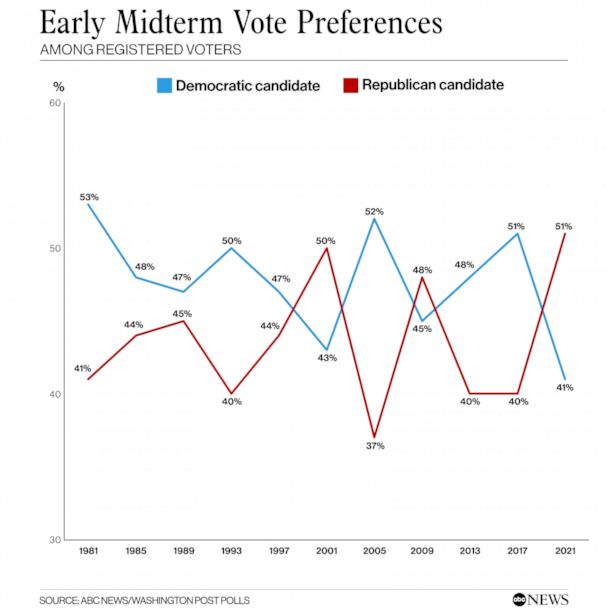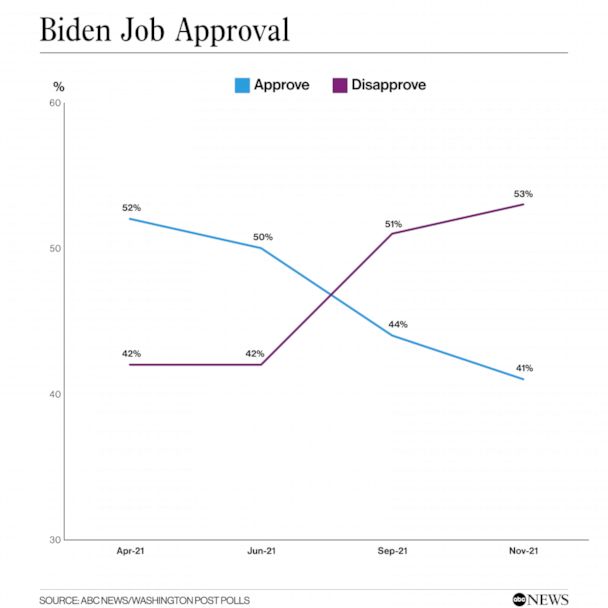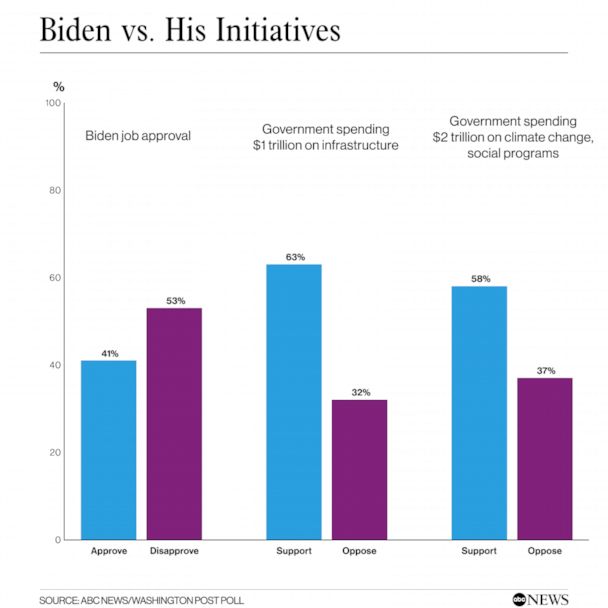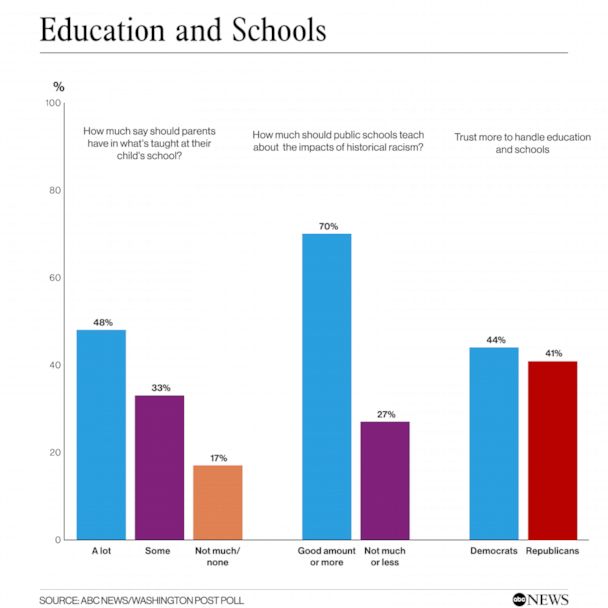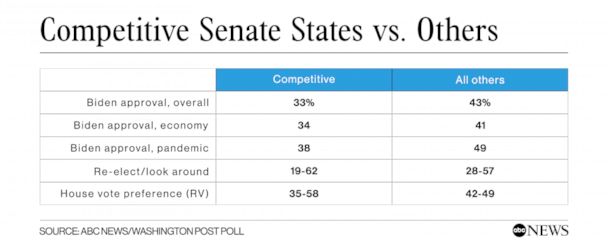Biden's sinking approval rating, at 41%, gives Republicans early advantage in 2022 midterms: POLL
If the midterm elections were today, 51% of registered voters say they'd support the Republican candidate.

WASHINGTON -- Republican congressional candidates currently hold their largest lead in midterm election vote preferences in ABC News/Washington Post polls dating back 40 years, underscoring profound challenges for Democrats hoping to retain their slim majorities in Congress next year.
While a year is a lifetime in politics, the Democratic Party's difficulties are deep; they include soaring economic discontent, a president who's fallen 12 percentage points underwater in job approval and a broad sense that the party is out of touch with the concerns of most Americans -- 62% say so.
See PDF for full results, charts, and tables.
About as many people see the Republican Party as out of touch (58%), and there's some solace for Democrats in other results. Notably, President Joe Biden's keystone policy initiatives are far more popular than he is, with 63% support for the $1 trillion infrastructure bill passed by Congress and 58% support for the now nearly $2 trillion social spending bill still under debate.
MORE: Biden, Democrats failing to sell agenda to American people, according to poll

Yet, with the infrastructure bill secured, Biden gets little credit in this poll, which was produced for ABC News by Langer Research Associates. Just 31% say he's keeping most of his major campaign promises, and 35% think he's accomplished much overall. And while most support his spending and policy plans, crosswinds are evident, as 59% worry he'll do too much to increase the size and role of government, up 6 points since spring.
As things stand, if the midterm elections were today, 51% of registered voters say they'd support the Republican candidate in their congressional district, 41% say the Democrat. That's the biggest lead for Republicans in the 110 ABC/Post polls that have asked this question since November 1981. Indeed, it's only the second time the GOP has held a statistically significant advantage (the other was +7 points in January 2002) and the ninth time it's held any numerical edge at all.
Factors/Biden
Among the key factors is the economy. With inflation soaring, 70% say the economy is in bad shape, up from 58% last spring. While just half blame Biden directly for inflation -- its worst in 31 years -- his approval for handling the economy overall is down to 39%, off 6 points just since early September and 13 points from last spring.
Now, 55% disapprove of Biden's economic performance -- 6 points more than former President Donald Trump's highest disapproval rating on the economy in September 2017. Just over a year later, Trump's Republicans lost 40 House seats in the 2018 midterms.
In terms of Biden's job performance overall, a new low of 41% approve, while 53% disapprove, highly similar to his rating on the economy. Biden's lost 11 points in approval since spring, accelerating with the coronavirus Delta surge and continuing with inflation.
Specifically on the pandemic, Biden's rating is less bad, a 47-49% split, approve-disapprove. But that is numerically (albeit not significantly) underwater for the first time, with approval ebbing from 64% in April and 62% in June, both pre-Delta surge.
Biden's overall approval rating sets or matches career lows among nearly all demographic groups, with positive assessments among most down significantly from their peaks in the spring or summer. The exception is those who already were highly critical of the president, such as Republicans, conservatives and rural residents.
It's notable that Biden gets just 35% approval from independents -- while 63% of independents support the infrastructure bill and 58% support the $2 trillion climate change and social policy package.
Looking to the midterms, 58% of all adults (and 59% of registered voters) are inclined to look around for someone new to vote for. That's fairly typical, albeit slightly above its average in polls back to 1989. (And House incumbents overwhelmingly tend to get re-elected - 92% on average in midterm elections since 1946.) Nonetheless, marking Democratic challenges, registered voters interested in looking for someone new currently favor Republican over Democratic candidates by 20 points.
Education/racism
Even with the GOP advantages in this poll, results on education -- a hot-button issue in the Nov. 2 gubernatorial election in Virginia -- are nuanced. On one hand, a plurality, 48%, says parents should have "a lot" of say in what schools teach their children (as opposed to some, not much or none), and this group tilts heavily Republican. It's a view credited as a galvanizing issue for the winner in Virginia, Republican Glenn Youngkin.
On the other hand, a broad 70% of Americans say public schools should teach a great deal or good amount about how the history of racism affects the country today, an approach criticized by Youngkin and many Republican officeholders generally.
MORE: Republican Glenn Youngkin projected to win Virginia governor's race

Forty-four percent of Republicans endorse this teaching approach, rising to 73% of independents and 92% of Democrats. It's a question that splits conservatives, with 59% of "somewhat" conservative adults in support, dropping to 34% of those who call themselves "strongly" conservative. By race/ethnicity, 61% of whites support teaching about the impacts of racism, as do 83% of Hispanics and 91% of Black people.
In another question, 53% call their local public schools' pandemic response "about right," versus 25% who say too strict (another GOP rallying cry) and 16% not strict enough. (Parents are more likely than others to call these policies too strict, 31% vs. 22%.)
On balance, the public divides 44-41% between the Democratic and Republican parties in trust to handle education and the schools. Parents divide about the same, 43-43%.
Senate states
The 2022 vote question asks about generic Democratic or Republican candidate preferences for the U.S. House of Representatives. Also of interest is control of the closely divided U.S. Senate. Evaluating survey results in just eight states expected to have the most competitive Senate races -- four currently held by Democrats, four by Republicans -- raises further hope for the GOP and risk for the Democratic Party.
In these states -- Arizona, Florida, Georgia, Nevada, New Hampshire, North Carolina, Pennsylvania and Wisconsin -- Biden's overall job approval rating is 33%, compared with 43% elsewhere. On his handling of the pandemic, his approval is 11 points lower than in the rest of the country. On the economy, the difference is a non-significant 7 points.
Residents of these states also are less inclined to back their incumbent House member rather than to look around for someone new to support, 19% versus 28%. And registered voters in these states favor Republicans over Democrats for the House by a 23-point margin, 58-35%, vs. 7 points, 49-42%, in the rest of the country.
Vote groups
Differences in congressional vote preferences show the current state of play in likely 2022 battleground groups, with substantial improvements for Republicans compared with 2018.
Independents, who are often swing voters in national elections, favor GOP candidates by 50-32%; they voted +12 points Democratic in 2018. Moderates divide closely, +6 points for Democratic candidates, 48-42%, as opposed to +26 points in 2018. Suburban voters favor Republicans by 54-39%, rural voters by a broad 66-26%. The Democratic advantage among urban residents, 52-38%, again is well off their 2018 result.
Demonstrating the role of the economy, those who say it's in excellent or good shape favor Democratic candidates by 75-19%. But among the broad majority who say it's in worse shape than that -- not so good or poor -- Republican candidates are favored, 63-28%.
Republican advantages in the two core groups of non-college-educated white men and women are more than 20 points broader now than in 2018. And another heartening result for Republicans is among Hispanics: They favor Democrats, but by just a 15-point margin, 49-34%. (This result is among all Hispanics, not just those registered to vote, for an adequate sample size. All other vote-preference results are among registered voters.) That compares to the last midterms in 2018, when, according to exit poll results, Hispanics voted Democratic by a 40-point margin.
Methodology
This ABC News/Washington Post poll was conducted by landline and cellular telephone Nov. 7-10, 2021, in English and Spanish, among a random national sample of 1,001 adults, including 882 registered voters. Results have margins of sampling error of 3.5 percentage points for the full sample and registered voters, including the design effect. Partisan divisions in the full sample are 27-26-37%, Democrats-Republicans-independents, and 28-28-36% among registered voters.
The survey was produced for ABC News by Langer Research Associates of New York, New York, with sampling and data collection by Abt Associates of Rockville, Maryland. See details on the survey's methodology here.


